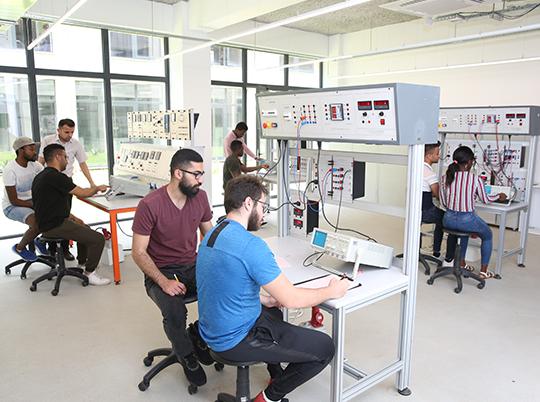Electrical and Electronics Engineering (MSc)



About the Program
Electric and Electronics Engineering is in the center of the high technology research and development activities. This program design and produce lots of equipment which involves communication, health, security, comfort and good quality life conditions. In the Master’s Program of Electric and Electronics Engineering, students can carry out research and development activities in the fields of electrical power systems, telecommunications, circuits and systems, electromagnetic fields, microwave technology, and control and robotic systems. In the selected research area, students gain in-depth knowledge regarding the design and solution techniques with effective knowledge in equipment and methods. Students can create effective solutions by deeply understanding the design techniques that need to be applied for the refinement of projects in their chosen field of specialization, and they may have deep knowledge of development tools and methods. For this purpose, students are able to access many well-known scientific sources online (such as IEEE, ACM...) and thus, can acquire up-to-date information by scanning many scientific journals.
Education Opportunities
The program concentrates on research areas like communication technologies (coding techniques, modulation techniques, communication networks), electric energy production, transmission, distribution methods and techniques, electromagnetic fields and microwave techniques (micro-strip antennas, FDTD analysis, electromagnetic scattering), with signal and image processing (filtering methods, face recognition, video coding). Students develop themselves by enrolling in the courses they are interested in. In addition to being able to design with state-of-the-art devices, research and development can also be done in the field of electric and electronics engineering by using simulation methods in high-capacity computers. Students are provided with laboratory facilities for collecting and synthesizing experimental data and thus obtaining many scientific results. In addition, students are able to obtain the necessary experience in the context of how they would be able to publish the scientific results they have obtained with the help of expert faculty members.

Career Areas
Graduates of this program can easily find jobs in both the public and the private sector. They can also pursue careers in areas such as project definition, development, research and development (RE&DE), work measurement, material management, production planning and control, quality control and business administration and management, especially in high technology companies. Among the sectors the graduates can work in are: wireless communication systems, fiber optic communication systems, renewable energy sources, energy efficiency, design and production of electric cars, control and robotic systems. In addition, students who have graduated from the program can continue their education in their doctoral program so that they can have the opportunity to become a research assistant and then, a faculty member at universities.
Contact
Institute of Graduate Studies and Research
Graduate Sciences and Education Center, GE106
Tel: +90 392 671 1111 Extension: 2776
Institute E-mail: ciu-institute@ciu.edu.tr
Compulsory Courses
First Semester
NUMERICAL LINEAR ALGEBRA
Course code
EELE501Credit
3Theoretical
3Practical
0Ects
8CIRCUITS AND SYSTEMS ANALYSIS
Course code
EELE502Credit
3Theoretical
3Practical
0Ects
8ELECTIVE I
Course code
EELE5X1Credit
3Theoretical
3Practical
0Ects
8ELECTIVE II
Course code
EELE5X2Credit
3Theoretical
3Practical
0Ects
8ELECTIVE III
Course code
EELE5X3Credit
3Theoretical
3Practical
0Ects
8ELECTIVE IV
Course code
EELE5X4Credit
3Theoretical
3Practical
0Ects
8ELECTIVE V
Course code
EELE5X5Credit
3Theoretical
3Practical
0Ects
8Second Semester
THESIS
Course code
EELE500Credit
0Theoretical
0Practical
0Ects
60SEMINAR
Course code
EELE590Credit
0Theoretical
0Practical
0Ects
4Elective Courses
RESEARCH METHODS
Course code
EMNT525Credit
3Theoretical
3Practical
0Ects
0PHOTOVOLTAIC SYSTEMS
Course code
EELE582Credit
3Theoretical
3Practical
0Ects
0ADVANCED COMMUNICATION SYSTEMS
Course code
EELE561Credit
3Theoretical
3Practical
0Ects
0ADVANCES ON VLSI DESIGN
Course code
EELE544Credit
3Theoretical
3Practical
0Ects
POWER SYSTEM PROTECTION AND CONTROL
Course code
EELE558Credit
3Theoretical
3Practical
0Ects
HIGH VOLTAGE UNDERGROUND CABLES
Course code
EELE555Credit
3Theoretical
3Practical
0Ects
NUMERICAL METHODS IN ELECTROMAGNETICS
Course code
EELE534Credit
3Theoretical
3Practical
0Ects
POWER SYSTEM HARMONICS
Course code
EELE557Credit
3Theoretical
3Practical
0Ects
ANALOG FILTER DESIGN
Course code
EELE568Credit
3Theoretical
3Practical
0Ects
0FUNDAMENTALS OF ENERGY SYSTEMS OPTIMIZATION
Course code
ENRE533Credit
3Theoretical
3Practical
0Ects
DIGITAL IMAGE PROCESSING
Course code
EELE526Credit
3Theoretical
3Practical
0Ects
0ADVANCED DIGITAL SIGNAL PROCESSING
Course code
EELE525Credit
3Theoretical
3Practical
0Ects
TECHNO-ECONOMICAL ANALYSIS OF ENERGY APPLICATIONS
Course code
ENRE502Credit
3Theoretical
3Practical
0Ects
SOLAR - THERMAL ENERGY AND ITS APPLICATIONS
Course code
EELE581Credit
3Theoretical
3Practical
0Ects
ADVANCED ANTENNA THEORY
Course code
EELE532Credit
3Theoretical
3Practical
0Ects
SIGNALS AND SYSTEMS
Course code
EEE321Credit
0Theoretical
0Practical
0Ects
INTRODUCTION TO PROGRAMMING
Course code
CMPE112Credit
0Theoretical
0Practical
0Ects
ELECTRICAL MACHINERY
Course code
EEE453Credit
0Theoretical
0Practical
0Ects
POWER SYSTEM ANALYSIS
Course code
ELE401Credit
0Theoretical
0Practical
0Ects
APPROXIMATION THEORY
Course code
EELE563Credit
3Theoretical
3Practical
0Ects
PERFORMANCE EVALUATION OF COMPUTER NETWORKS
Course code
CMPE523Credit
3Theoretical
3Practical
0Ects
COMMUNICATION SYSTEMS
Course code
EEE362Credit
0Theoretical
0Practical
0Ects
PROBABILITY THEORY AND STOCHASTIC PROCESSES
Course code
EELE571Credit
3Theoretical
3Practical
0Ects
SOLAR POWER DESIGN
Course code
ENRE507Credit
3Theoretical
3Practical
0Ects
HIGH VOLTAGE TECHNIQUES
Course code
EEE456Credit
0Theoretical
0Practical
0Ects
POWER ELECTRONICS
Course code
EEE344Credit
0Theoretical
0Practical
0Ects
ELECTRONICS II
Course code
EEE342Credit
0Theoretical
0Practical
0Ects
ARTIFICIAL NEURAL NETWORKS
Course code
CMPE545Credit
3Theoretical
3Practical
0Ects
SELECTED TOPICS IN DIGITAL COMMUNICATIONS
Course code
EELE566Credit
3Theoretical
3Practical
0Ects
PROJECT SCHEDULING
Course code
EMNT503Credit
3Theoretical
3Practical
0Ects
HYDROGEN AND FUEL CELL TECHNOLOGY
Course code
ENRE511Credit
3Theoretical
3Practical
0Ects
WIRELESS COMMUNICATION SYSTEMS
Course code
EELE464Credit
0Theoretical
0Practical
0Ects
CIRCUIT THEORY II
Course code
EEE301Credit
0Theoretical
0Practical
0Ects
6DESIGN OF ZERO EMISSION 100% RENEWABLE CITIES
Course code
ENRE537Credit
3Theoretical
3Practical
0Ects
SMART POWER GRIDS
Course code
ENRE535Credit
3Theoretical
3Practical
0Ects
COMPUTER NETWORKS AND COMMUNICATIONS
Course code
CMPE530Credit
3Theoretical
3Practical
0Ects
ENERGY - PAST, PRESENT & FUTURE
Course code
ENRE501Credit
3Theoretical
3Practical
0Ects
0WIRELESS COMMUNICATION SYSTEMS
Course code
EEE464Credit
0Theoretical
0Practical
0Ects
INTEGRATION OF RENEWABLES
Course code
ENRE512Credit
3Theoretical
3Practical
0Ects
LINEAR CONTROL SYSTEMS
Course code
ELE306Credit
0Theoretical
0Practical
0Ects
COMPUTER ARCHITECTURE
Course code
CMPE511Credit
3Theoretical
3Practical
0Ects
BIOSENSORS
Course code
BIOE507Credit
3Theoretical
3Practical
0Ects
ELECTROMAGNETIC THEORY II
Course code
EEE331Credit
0Theoretical
0Practical
0Ects
PROGRAMMING LANGUAGES
Course code
CMPE501Credit
3Theoretical
3Practical
0Ects
PRODUCTION PLANNING AND SCHEDULING
Course code
EMNT501Credit
3Theoretical
3Practical
0Ects
0OPERATIONS RESEARCH TECHNIQUES
Course code
EMNT517Credit
3Theoretical
3Practical
0Ects
0COMPUTER VISION
Course code
ISYE537Credit
3Theoretical
3Practical
0Ects
POWER TRANSMISSION AND DISTRIBUTION
Course code
ENRE401Credit
0Theoretical
0Practical
0Ects
CIRCUIT THEORY I
Course code
EEE202Credit
0Theoretical
0Practical
0Ects
COMPUTER ARCHITECTURE
Course code
EELE512Credit
3Theoretical
3Practical
0Ects
PATTERN RECOGNITION
Course code
CMPE546Credit
3Theoretical
3Practical
0Ects
TOTAL QUALITY MANAGEMENT
Course code
EMNT502Credit
3Theoretical
3Practical
0Ects
0POWER SYSTEM ENGINEERING AND ECONOMICS
Course code
ENRE506Credit
3Theoretical
3Practical
0Ects
ELECTRICAL MATERIALS
Course code
ELE305Credit
0Theoretical
0Practical
0Ects
ROBOTICS
Course code
EEE411Credit
0Theoretical
0Practical
0Ects
COMPUTER NETWORKS AND COMMUNICATIONS
Course code
EELE529Credit
3Theoretical
3Practical
0Ects
RENEWABLE ENERGY POLICIES & SCENATIOS
Course code
ENRE524Credit
3Theoretical
3Practical
0Ects
INFORMATION SECURITY
Course code
MISY558Credit
3Theoretical
3Practical
0Ects
PROGRAMMABLE LOGIC CONTROLLERS
Course code
EELE415Credit
0Theoretical
0Practical
0Ects
POWER GENERATING SYSTEMS
Course code
ENRE534Credit
3Theoretical
3Practical
0Ects
Students who are interested in pursuing advanced graduate studies leading to a master’s, doctoral degree, or professional doctorate degree for the Fall and Spring semesters every year. Applicants can directly apply online to our graduate programs using the application portal.
TR Applicants- Required documents:
- Bachelor’s Degree Diploma
- Bachelor’s Degree transcripts for each completed academic term/year.
- Valid ALES result document (must not exceed 5 years),
- Documents to prove English proficiency for English language departments,
- Scanned copy of passport or identity card.
Click for detailed admission requirements information.
TRNC Applicants- Required documents:
- Bachelor’s Degree Diploma
- Bachelor’s Degree transcripts for each completed academic term/year.
- Documents to prove English proficiency for English language departments,
- Scanned copy of passport or identity card.
Click for detailed admission requirements information.
Students who are interested in pursuing advanced graduate studies leading to a master’s, doctoral degree, or professional doctorate degree for the Fall and Spring semesters every year. Applicants can directly apply online to our graduate programs using the application portal.
International Applicants- Required documents;
- Bachelor’s Degree Diploma
- Bachelor’s Degree transcripts for each completed academic term/year.
- Evidence of English Language competence: TOEFL (65 IBT) or IELTS (5.5). Students without these documents will take the CIU English proficiency exam on campus following arrival.
- Scanned copy of international passport/birth certificate
- CV
- Fully completed and signed CIU Rules and Regulations document (which can be downloaded during the online application)
Click for detailed admission requirements information.
Cyprus International University provides academic scholarships for its students as an incentive for success, with most students benefiting from 50%, 75% or 100% scholarships or discounted tuition fees. Click for more information.
Tuition Fees are determined at the beginning of each academic year. Candidate students who are entitled to enroll in CIU can learn their fees in line with the Tuition Fee Calculation system.